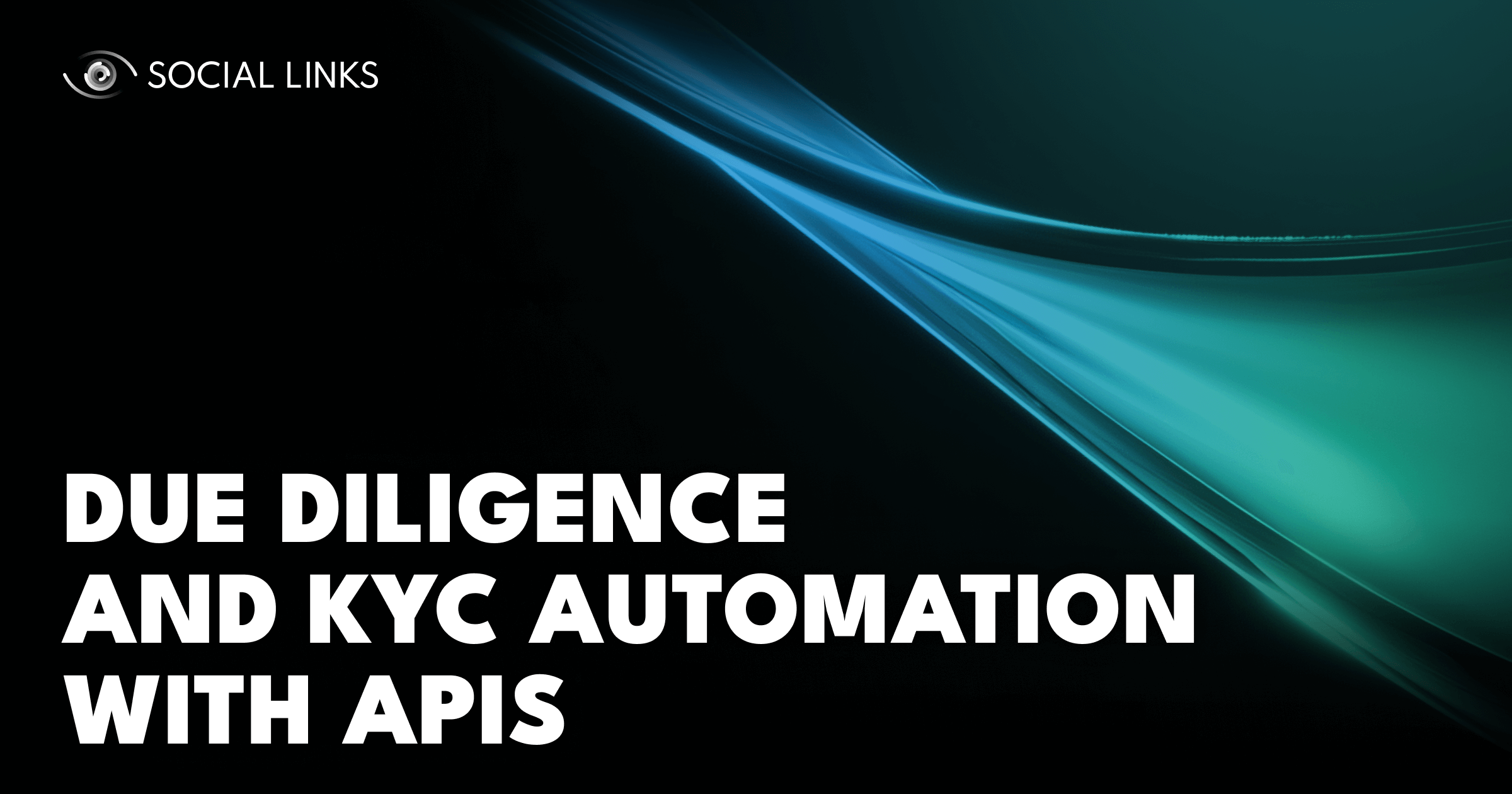Due Diligence and KYC Automation with APIs


Today, every business needs to know who it works with. Financial institutions, fintechs, and other companies must check their clients, partners, and vendors to follow the law and protect their reputation and intellectual property.
Due diligence and KYC (Know Your Customer) are key parts of corporate security. They help detect high-risk customers, prevent fraud, and ensure that all relationships meet legal and ethical standards.
But manual checks take too much time. Teams often search through hundreds of records by hand, compare data from different systems, and risk missing key details. That’s why KYC process automation with APIs is changing how companies work.
Modern organizations deal with millions of data points every day. API-based automation helps make sense of this information instantly. Instead of waiting for reports or manual updates, companies get real-time insights and can make faster, safer decisions.
Manual due diligence is slow, expensive, and hard to scale. People must collect customer information, verify documents, and check it all against watchlists. This verification process is time consuming and open to human error.
When customer volumes grow, it becomes impossible to manage everything by hand. Delays during onboarding or risk assessments make companies less responsive and create potential risks. If errors happen, the cost can be high — from regulatory fines to reputational damage.
Automation removes these limits. APIs can check hundreds of profiles in seconds and spot inconsistencies automatically. They reduce the risk, improve accuracy, and free teams from repetitive work.
Many compliance teams find that automation not only saves time but also improves morale. Analysts spend less time on basic data entry and more time on real investigation, strategy, and risk management. It makes daily work smoother and helps companies stay compliant even as regulations evolve.
APIs (Application Programming Interfaces) make compliance faster and more consistent. They connect directly to trusted databases and return results in seconds.
With one integration, companies can:
For example, when a new customer signs up, an API can instantly verify their identity, check their company registration, and confirm that they’re not on any sanctions lists. It can also analyze business transactions to identify strange behavior, such as unusual payments or repeated activity from high-risk countries.
APIs also help ensure that every verification follows the same steps, which improves transparency and audit readiness. Teams can show regulators exactly how each customer was verified — automatically, accurately, and in line with company policy.
This approach improves trust both inside and outside the organization. Partners and investors know that compliance is taken seriously and handled with the same quality every time.
APIs support many parts of the compliance process. Let’s look at how they work in practice.
1. Customer Onboarding. During onboarding, a KYC API checks customer data and customer information instantly. It verifies IDs, reviews sanctions lists, and highlights high-risk profiles before approval. This reduces delays and speeds up the onboarding process — a win for both compliance and sales teams.
2. Vendor and Partner Screening. In corporate due diligence, APIs collect legal data, ownership structures, and media coverage. Compliance teams can easily identify potential risks before any contracts or business transactions take place.
3. Continuous Monitoring. APIs help companies monitor customers and vendors 24/7. They send alerts when something changes — for example, a new director appears, a company is deregistered, or a name is added to a sanctions list. This constant flow of data allows companies to react fast and reduce the risk of being connected to suspicious activity.
4. Fraud Prevention. Automated checks detect fake accounts, unauthorized access, or data leaks in real time. Using AI-powered pattern recognition, APIs can spot unusual login behavior or duplicate IDs, helping to stop fraud before it spreads.
5. Compliance Reporting. APIs also make reporting easier. They gather and store verification data securely, helping compliance officers prove that all KYC checks were completed.
Automation turns compliance from a heavy obligation into a smooth, reliable process.
Trust is the foundation of modern business. APIs make that trust visible and measurable. Instead of one-time reports, teams can follow every change as it happens.
Real-time verification helps companies stay confident in who they work with. If a client’s risk profile changes, or if a person appears in a leak or news report, the API alerts the compliance team instantly.
This fast feedback loop supports risk management and ensures compliance with the latest rules. It also builds stronger relationships with customers who value transparency and safety.
In industries like finance, insurance, and e-commerce, this can be the difference between a secure deal and a major loss. APIs give companies the visibility they need to protect both their finances and their intellectual property.
Not every API fits every business. When selecting a tool for due diligence or KYC, companies should look for:
The best APIs are flexible and easy to customize. They can connect to multiple systems, pull data from global databases, and handle large-scale checks without slowing down.
When implemented well, APIs become a key part of corporate security — protecting customer data, improving workflows, and giving businesses a clear edge in efficiency.
APIs make due diligence and KYC faster, safer, and smarter. They automate identity verification, risk assessments, and fraud detection, helping companies reduce the risk and ensure compliance.
Automation replaces manual work with real-time insights. It helps teams act quickly, build trust, and manage high-risk situations with confidence. Instead of spending days checking documents, compliance professionals can focus on strategy, prevention, and long-term value.
Due diligence automation with APIs is not just about saving time — it’s about transforming how businesses handle risk. It brings together accuracy, speed, and security, all in one simple process. For any company that values trust and safety, API-driven KYC is the next natural step.